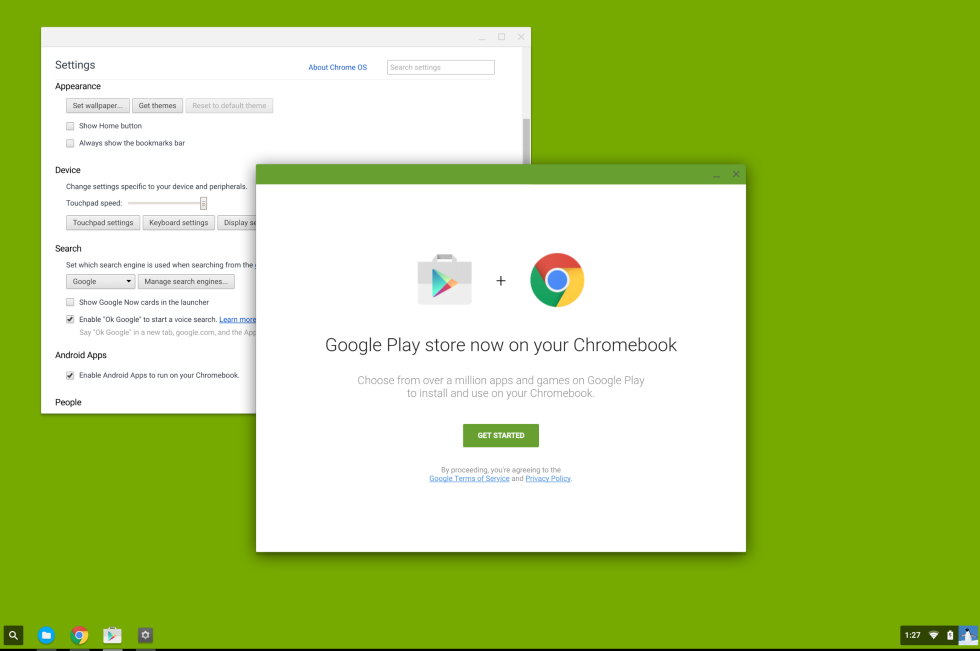Firstly, from Liliputing:
There’s no shortage of low-cost laptops on the market today, but most run Google’s Chrome OS or Microsoft’s Windows 10 operating systems. But last year some Chinese device makers started offering models with Jide’s Remix OS as an option, and it looks like more models may be on the way. Charbax from ARMDevices got a chance to check out a few reference designs from chip maker Allwinner.
These laptops have entry-level specs, low price tags, and a custom version of Android that adds desktop-style features like a taskbar, desktop, and support for running most Android apps in resizeable windows.
Charbax looked at three different models:
- An 11.6 inch notebook
- A 14.1 inch notebook
- An 11.6 inch convertible with a touchscreen display and a 360 degree hinge
He notes that prices could be as low as $79 for some models… but only if you place a large order for hundreds or thousands of units with barebones specs (like 1GB of RAM and 8GB of storage). Actual prices for individual laptops are likely to be a bit closer to what you’d pay for an entry-level Chromebook (I’d guess somewhere between $120 and $200).
Allwinner is showing designs featuring its Allwinner A64 quad-core, 64-bit processor and its octa-core Allwinner A83T 32-bit chip. Each of the prototypes has a 1366 x 768 pixel display and it doesn’t seem like there are any models with more than 2GB of RAM or 32GB of storage, although it might be possible that we could see versions with better specs in the future. There’s no word on when you’ll be able to buy one of these laptops with Remix OS.
There's a hands-on video too:
Now, these are relatively low end, but Android does seem to be scaling quite well with the ReMix OS version and you can imagine devices with twice the specs and price rivalling budget Windows 10 laptops.
So we have a phone OS that's being adapted to work on 'desktops', though of course we're worlds away from 'desktop apps', at least the sort of thing you might expect to run in a business environment. And it's still a totally separate device from the user's phone - while the various Continuum lapdocks that have been shown off so far are separate hardware but 'dumb' and all the clever information and authentication comes from the Windows 10 Mobile phone.
But, as I say, interesting. And, along similar lines, there are rumours on ArsTechnica that Chromebooks might be enabled to run Android applications in the very near future, again slightly blurring the laptop/phone lines, though again with two physical bits of computing hardware involved (compared to Continuum's one):
Google first brought the ability to run Android apps on Chrome OS with a project called the "App Runtime for Chrome (ARC)." Google built an Android runtime on Chrome OS and partnered with select developers to port a handful of Android apps. Now it sounds like Google is ready to unleash millions of Android apps onto the platform by bringing the entire Play Store to Chrome OS.
In the Chrome OS subreddit, users are reporting some interesting behavior in their Chromebooks. "TheWiseYoda" noticed that when the settings first load up, an option flashes on screen that reads, "Enable Android apps to run on your Chromebook." The option immediately disappears, so it's not possible to click on its confirmation box. We were able to replicate this on our second-gen Chromebook Pixel running the developer build....
We haven't heard any official news about Google Play coming to Chrome OS, but Google I/O is right around the corner.
So we have a 'phone' OS being modified to run on the desktop and a 'desktop' OS being modified officially to run phone apps. The personal computing world is getting a lot more complicated but I still think that Microsoft's more ambitious vision for the future has the best chance of reinventing how all this will work in 2018 and beyond.

